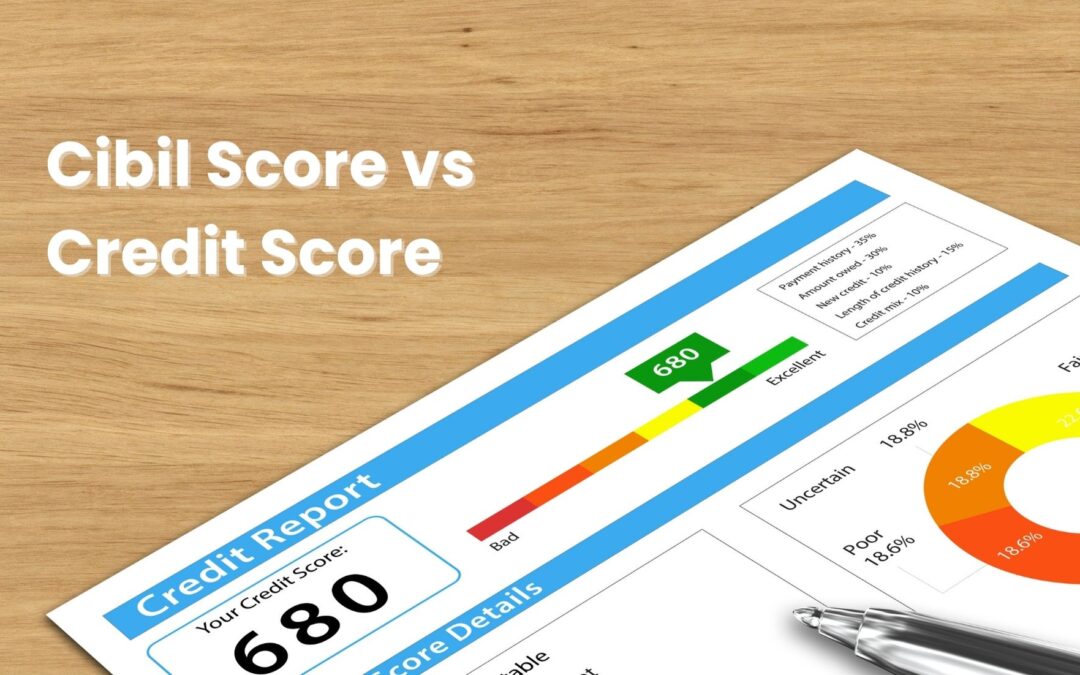Managing your finances wisely is a crucial aspect of modern life. As you navigate the complex world of personal finance, you’ve probably heard the terms “Cibil Score” and “Credit Score” thrown around. Cibil Score vs Credit Score is a common debate. These scores play a pivotal role in determining your eligibility for loans, credit cards, and various financial opportunities.
In this comprehensive guide, we will unravel the intricacies of Cibil Score vs. Credit Score – what’s the difference? By the end of this article, you’ll have a deep understanding of how these scores work and why they are essential.
Have you tried saving in 24k digital gold? Download the Jar App and try it out now.
Cibil Score vs Credit Score – What’s the Difference?
To grasp the distinctions between Cibil Score and Credit Score, we need to dive into the specifics.
Cibil Score
Cibil Score, also known as your Credit Information Report (CIR) score, is a numerical representation of your creditworthiness in India. This three-digit score, ranging from 300 to 900, is generated by the Credit Information Bureau India Limited (Cibil). It primarily reflects your financial history within the Indian credit system. The higher your Cibil Score, the lower the credit risk you pose to lenders.
Credit Score
The term “Credit Score” is used more broadly and can encompass scores from different credit bureaus. In the United States, for example, credit scores are typically provided by agencies like Equifax, Experian, and TransUnion. While they may have different names, they all serve the same fundamental purpose: evaluating your creditworthiness. The higher your Credit Score, the more reliable you appear to lenders.
Significance
Understanding the significance of these scores is critical because they significantly impact your financial life.
Cibil Score
In India, your Cibil Score is a crucial factor when it comes to securing loans and credit cards. Financial institutions heavily rely on this score to assess your creditworthiness. A high Cibil Score can open doors to more favorable loan terms, lower interest rates, and increased credit limits. On the other hand, a low Cibil Score may lead to rejection of credit applications or unfavorable loan terms.
Credit Score
In countries like the United States, your Credit Score has a similar impact. Lenders, landlords, and even potential employers may check your credit history to gauge your trustworthiness. A robust Credit Score can lead to better interest rates on loans, more affordable housing options, and even improved job prospects.
Calculation Method
The calculation of Cibil Score and Credit Score varies depending on the credit bureau and the country in which they are used.
Cibil Score
Cibil Score is determined by evaluating various aspects of your credit history, including your repayment behavior, outstanding debts, credit utilization, and the length of your credit history. Maintaining a clean credit history with on-time payments is crucial for achieving a high Cibil Score.
Credit Score
Credit Scores from different bureaus use similar factors, such as payment history, credit utilization, and credit inquiries. However, the specific algorithms and weightings may vary. To maintain a strong Credit Score, it’s essential to monitor your credit report regularly and address any discrepancies or errors promptly.
Impact on Financial Life
Both Cibil Score and Credit Score have a substantial impact on your financial life.
Cibil Score
In India, a poor Cibil Score can be a roadblock when trying to secure loans or credit cards. It can lead to higher interest rates, stricter loan terms, or even rejection of credit applications. A healthy Cibil Score is essential for a smooth financial journey.
Credit Score
In the United States and other countries, a low Credit Score can have similar consequences. Lenders may offer less favorable terms, and you might miss out on opportunities that require a strong credit history.
Conclusion
In conclusion, Cibil Score and Credit Score are essential tools in the world of personal finance, both serving the purpose of assessing creditworthiness. While they share a common objective, their calculation methods, significance, and impact can vary depending on the country and credit bureau. Whether you are navigating the Indian or international financial landscape, understanding these scores is the key to making informed financial decisions.
FAQs
Is there a universal credit scoring system?
No, there isn’t a universal credit scoring system. Different countries and even different credit bureaus within the same country have their own scoring models and algorithms.
How often should I check my credit score?
It’s advisable to check your credit score regularly. In India, you can access your Cibil Score report for free once a year. In the United States, you can obtain a free credit report from each major credit bureau annually.
What’s considered a good Cibil Score or Credit Score?
In India, a Cibil Score above 750 is generally considered excellent. In the United States, a Credit Score above 700 is typically seen as good.
Can I improve my Cibil Score or Credit Score?
Yes, you can improve your score by making on-time payments, reducing outstanding debts, and maintaining a clean credit history. This is a gradual process, but it can significantly enhance your creditworthiness over time.
Do credit bureaus share information internationally?
Credit bureaus usually do not share credit information internationally. Your credit history is typically confined to the country where you reside.
What happens if I have no credit history?
If you have no credit history, your credit score may be low. To build credit, you can start by responsibly using credit products, such as a credit card, and making on-time payments.

